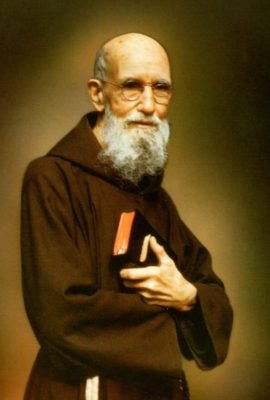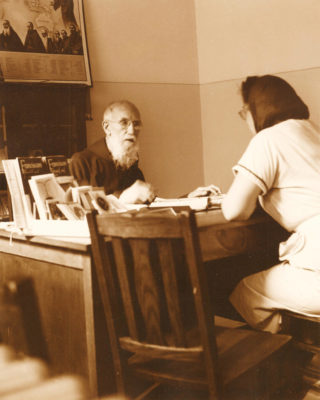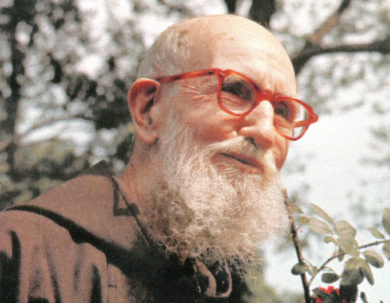May 6, 2017
Father Solanus Casey recalled as beloved friar who showed mercy to others
NATIONAL
By Mike Stechschulte, Catholic News Service

The sainthood cause of Wisconsin-born Father Solanus Casey (1870-1957), a Capuchin priest and doorkeeper at Franciscan friaries in New York and Detroit, has advanced to the beatification stage after Pope Francis approved a miracle attributed to his intercession. Father Casey is pictured in an undated image. (CNS photo)
DETROIT (CNS) — Sixty years after his death, Capuchin Father Solanus Casey is on his way to sainthood.
Pope Francis announced May 4 that Detroit’s beloved friar, who earlier had been named venerable, met the requirements for beatification and will be named “blessed” — the second U.S.-born man to achieve such a designation and the first person from Michigan.
Although Father Casey was born in Oak Grove, Wisconsin, in 1870, he spent most of his adult life and ministry in Detroit, caring for sick, poor and downtrodden people and lending a listening ear and caring heart to the thousands who came to him for counsel, wisdom and aid.

Father Solanus Casey, a Capuchin priest in Detroit, Mich., is seen talking to a woman in this 1954 file photo. During his lifetime, countless men, women and young people came to him seeking wisdom, counsel and aid. (CNS photo/The Michigan Catholic)
Among the hundreds, if not thousands, of healings attributed to Father Casey during and after his lifetime, Pope Francis recognized the authenticity of a miracle necessary for the friar to be elevated from venerable to blessed after a review by the Vatican’s Congregation for Saints’ Causes was completed earlier this year.
“The beatification of Father Solanus Casey is an incomparable grace for the church in the Archdiocese of Detroit and for the whole community of Southeast Michigan,” Detroit Archbishop Allen H. Vigneron said in a statement. “He is an inspiration to all us Catholics — and to all — of the power of grace to transform one’s life.”
The miracle needed to raise Father Casey to blessed involved a woman with an incurable genetic skin disease. The woman was visiting friends in Detroit and stopped at Father Casey’s tomb to pray for others’ intentions. After her prayers, she felt the strong urging to ask for the friar’s intercession for herself, too, and received an instant and visible healing.
The miraculous nature of her cure was verified by doctors in her home country, in Detroit and in Rome, all of whom confirmed there was no scientific explanation.
In a blessed coincidence — or perhaps not — Father Casey himself died of a skin disease in 1957.
The beatification, which will take place during a Mass in Detroit later this year, is the final step before sainthood. A declaration of sainthood requires a second miracle attributed to Father Casey’s intercession.
Capuchin Father Michael Sullivan, provincial minister of the Capuchin Franciscan Province of St. Joseph in Detroit, said the friars were elated with the news.
“Long before we knew and loved Pope Francis, we had the example of Father Solanus, who lived the Gospel of mercy,” Father Sullivan said. “Known for his compassion and simplicity, he drew many thousands to God. Rather than call attention to himself, he taught people to thank God for his blessings. We are overjoyed at the news that Father Solanus’ holiness is recognized by the Holy Father.”
Not only did Father Casey teach others to thank God, but he often urged them to thank God “ahead of time” for the blessings they were yet to receive — an admonition adopted often by Archbishop Vigneron and others invoking the friar’s memory.
Born Bernard Francis Casey Nov. 25, 1870, Father Casey was the sixth of 16 children to Irish immigrants Bernard James Casey and Ellen Elizabeth Murphy. He enrolled at St. Francis High School Seminary near Milwaukee in 1891, but because of academic limitations, he was advised to consider joining a religious order instead.
After reflecting before a statue of Mary, he felt the urging to “go to Detroit” and heeded this advice, joining the Capuchin order in 1897. He was given the religious name Solanus.
Although he continued to struggle academically, Father Casey was at last ordained in 1904 by Milwaukee Archbishop Sebastian G. Messmer as a “simplex priest,” meaning he could celebrate Mass but could not preach doctrinal sermons or hear confessions.

Father Solanus Casey, a Capuchin priest in Michigan and New York, is seen in this undated photo. Pope Francis advanced the sainthood cause of the Wisconsin-born Capuchin priest. (CNS photo/The Michigan Catholic)
After serving for two decades in friaries and churches in New York, Father Casey was transferred back to Detroit in 1924, where he began working as the porter, or doorkeeper, of St. Bonaventure Monastery.
It was in this role — which eventually became the title of a 1968 biography written by James Patrick Derum, The Porter of St. Bonaventure’s — that Father Casey cemented his reputation for holiness and compassion. Charged with greeting those who came to the monastery’s doors, Father Casey conducted well-attended services for the sick and became known for his gentle, wise counsel and genuine concern for those who sought his aid. He helped establish the Capuchin Soup Kitchen in 1929 to feed hungry people during the Great Depression, a work that continues in Detroit today.
By the time of his death July 31, 1957, devotion to Father Casey had grown to the point that more than 8,000 people attended his funeral, including those who traveled from afar to hear his guidance and keep his memory.
“Over the years the fame of Father Solanus has extended around the world, and now has devotees in 27 countries,” said Capuchin Friar Larry Webber, who, with Capuchin Brother Richard Merling, is a vice postulator for Father Casey’s beatification and canonization cause. “Thousands of favors attributed to the intercession of Venerable Solanus have been reported to the office of the cause for sainthood of Father Solanus.”
Officials began collecting and organizing material for Father Casey’s cause in 1976, and by 1983, an official archdiocesan investigation was opened into the life and virtues of the priest. During this phase, 53 witnesses gave sworn testimony to his heroic virtues, and the next year their testimonies were sent to the Vatican.
As part of the process, Father Casey’s tomb was opened July 8, 1987, and his remains were moved to their current resting place inside the north transept of St. Bonaventure’s Chapel.
Led by Capuchin Brother Leo Wollenwebber, a three-volume “positio” was presented to the Vatican congregation, which affirmed Father Casey’s heroic virtues in 1995. On July 11, 1995, Father Casey was named “venerable” by St. John Paul II, allowing for public devotion and advancing the cause for beatification.
Twenty-one years later, Sept. 22, 2016, a panel of medical experts approved a miraculous healing attributed to Father Casey. A panel of theological advisers concurred Jan. 19, paving the way for the Vatican congregation to recommend beatification to Pope Francis.
“This declaration means that the local church, here in Detroit and in Capuchin Franciscan fraternities around the world, may offer prayers and Masses invoking the intercession of Father Solanus,” Brother Merling said.
Stechschulte is managing editor of The Michigan Catholic, newspaper of the Archdiocese of Detroit.


 Facebook
Facebook Youtube
Youtube
